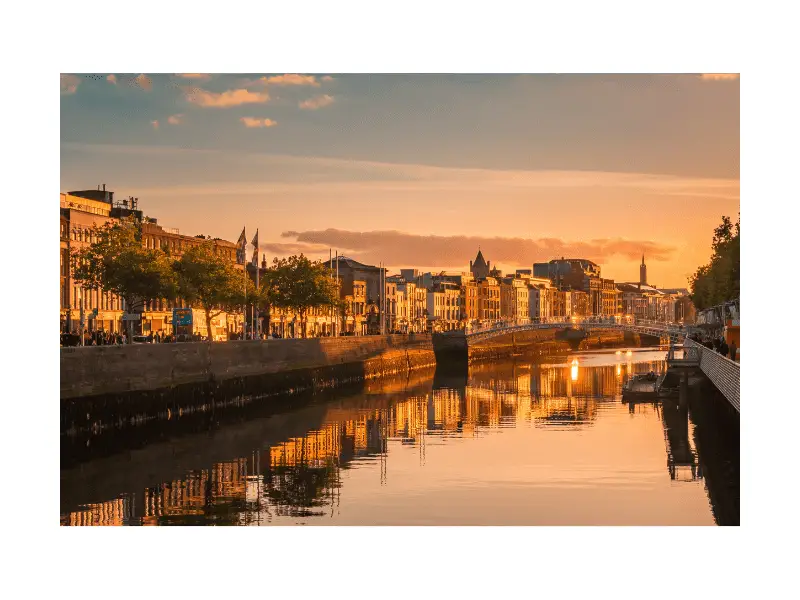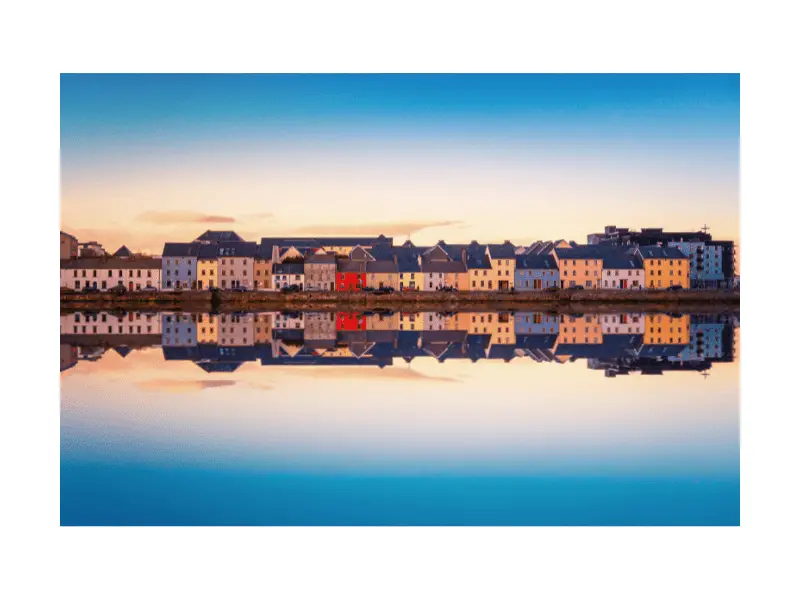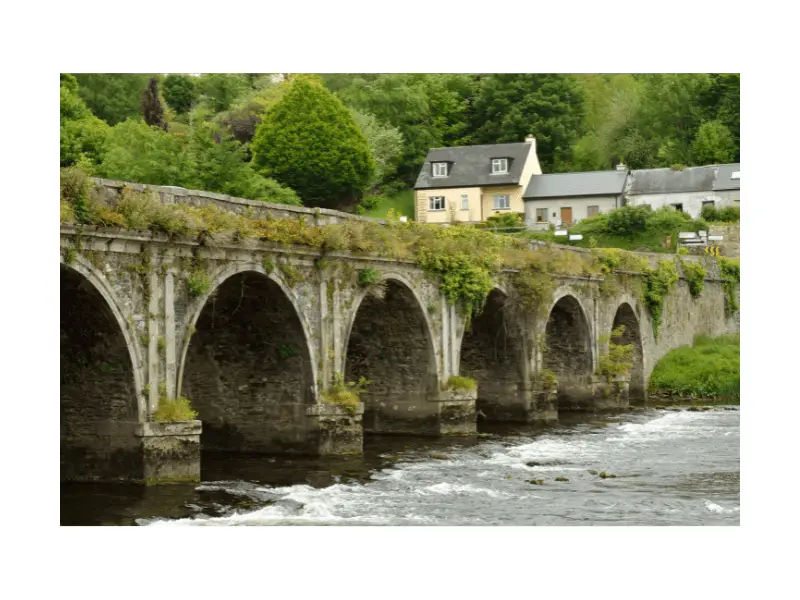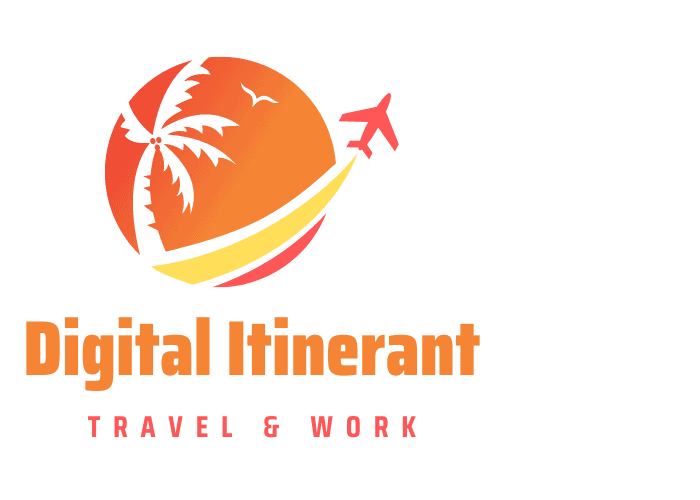Are you considering Ireland as a place to base your digital nomad lifestyle? Here’s some information on the type of internet speed to expect, the visa you will need, and the best places to go to. Let’s find out how great is Ireland for digital nomads?
Internet Speed In Ireland
Wifi Network
WiFi is found across the country, although between urban and rural parts the speed can vary greatly. According to the Irish website The Journal, the lowest broadband speed is found in Longford in Central Ireland at an average of 7.25Mbps. While Dublin ranks first with an average of 44.85Mbps. This article does take into account fixed broadbands as well but should give an idea of the coverage and speed of wireless internet in Ireland.
Speedtest.com tells us that the median mobile broadbands speeds are at 27.96Mbps in download and 8.91Mbps in upload. Ireland is also ranked 44th of in the global ranking of internet speeds made by the company “Worldwide Broadband Speed League”.
It is safe to say that wireless internet is more than available in Ireland and can be a reliable source to stay connected and work without stress.
4G/5G Coverage
As shown by this map on Nperf.com, 4G and 4G+ networks are widely available in many parts of the country. Even more surprising is the 5G coverage which you can find even outside of the big cities. If you intend to stay in Dublin, Cork, or Galway for a while and you have a newer phone, the 5G package from “Three Mobile” or “eir Mobile” may prove to be handy for smooth video calls, streaming, and uploading big amount of data.
Unlimited 5G plans start at €45 (~$50) per month and unlimited 4G plans at €15 (~$17) per month for a limited duration of one year then it goes up to €25 (~$28). For digital nomads that would only need the minimum requirements in internet speed, the best 4G plan is proposed by “eir Mobile”.
Digital Nomad Visa,
Is there a digital nomad Visa available?
As of now, Ireland doesn’t propose a visa for digital nomads, or more specifically a visa that would allow working remotely from Ireland. There is an option if you manage to find a job in Ireland that you can do remotely but it will rarely be the case. If you want more information about that visa, visit the Irish Immigration website.
What Visa digital nomads usually get to visit Ireland?
Remote workers tend to go for a short-stay visa which lasts for 90 days. However, visas are not needed to land in Ireland, which means everything can be handled on the spot, for many nationalities such as residents from the EU or EEA, the UK, the United States, Canada, and much more.
You’ll find a list of all the countries that qualify on CitizenInformation.ie in the section “Do I need a visa?”. There is the possibility to get a visa with multiple entries, for example, if you want to visit England or Northern Ireland although at the cost of an extra fee.
A short-stay visa costs €60 (~$67) for a single entry while multiple entry costs €100 (~$113).
This visa doesn’t typically allow you to work from Ireland, but it is used by people that would need to attend a business meeting or a short course. It is important to note that Ireland is not considered as a part of Schengen, therefore the short-stay visa doesn’t allow visiting countries in the Schengen area.
All things considered, this is the only viable visa for digital nomads and it’s pretty safe as well.
What are the best spots in Ireland for digital nomads?
Ireland offers a wide variety of spots for digital nomads, maybe the chill and laidback lifestyle of Galway or the city life of Dublin, a lot of options are available for you depending on what you’re looking for. One of the main activities in Ireland is hiking, there’s plenty to do specifically along the west and east coast such as sight-seeing the cliffs of Moher but also within the country. With these factors in mind, I selected 3 cities that will suit any kind of digital nomads.
Dublin

As I’ve mentioned above, Ireland’s capital city is the best destination for city life enjoyers who are looking to socialize with fellow nomads or local people and experience the nightlife in Irish pubs. Summers are warm and winters are cool which makes it a pleasant location all year round. There are also a lot of historic buildings to visit and the old industrial look can be quite charming, although not to everyone.
The other advantage is transportation since every road and railway is linked to Dublin, especially if you want to travel across the country.
You’ll find a few coworking spaces in the line of what I usually recommend: CoCreate (2 locations – North and South) and CoworkInn who offer a drop-in plan for nomads.
Galway

While not nearly as massive as Dublin, Galway is still considered a big city but way less populated. The harbor city is another fantastic spot for tourists of all sorts and remote workers that look for a more peaceful environment. It is also great during the summer, although not exclusively, due to the many activities available such as kayaking, windsurfing, and scuba diving in Connemara, regarded as one of the most beautiful places in the world.
Finally, I recommend WestWorks Coworking if you’re looking to get in touch with the local digital nomad community.
Kilkenny



A marvelous medieval-looking town known as the “Marble City”, located in the southwest of the island at roughly 65 kilometers from the east shore. Filled with history and old traditional pubs, this cozy town is not the usual base for digital nomads in Ireland. However, with both the 4G/5G coverage and the number of WiFi hotspots available, this should be perfect for people who want an authentic experience. Although, during the summer it could be fairly more crowded than excepted, given its touristic values.
Fun fact, Kilkenny is twinned with another fantastic medieval town named Moret-sur-Loing in France, the city where I grew up as a kid!
Cost of living in Ireland
With all the good things that Ireland provides for digital nomads, it was expected to find a negative aspect that balances it out and the cost of living in Ireland is definitely one of them.
It is one of the most expensive countries in Western Europe especially when it comes to accommodation in Dublin or Galway. To give you the best idea of what to expect, I’m going to break down the cost of living into three parts: accommodation, food, and transportation.
Accommodation cost in Ireland
As I was mentioning, the budget needed in order to live close to one of the major cities is quite high. A single hotel room will be at $20 dollars per night if planned on the spot, you could save a bit if you can book the room in advance. Single room Airbnb costs on average $800 to $1000 per month and finally, apartments reach even higher prices, above $1000 per month. To reduce the overall cost of living, it might be interesting to try to live a bit further away from the main cities and use public transportation or rent a car when needed.
Food cost in Ireland
On the other hand, filling up your belly while backpacking shouldn’t be too costly.
The average Fish’n’Chips will have basic menus for roughly $5 or slightly more while dining in a pub is going to be more expensive, between $10 and $15. Beers are affordable when compared to European standards, a pint costs $6.
Lastly, grocery shopping for a single person will cost around $300 per month.
Transportation costs in Ireland
Another important part to take into account when setting your budget to visit Ireland is going to be the cost of moving across the country. A 1-hour train ride costs on average $15 to $20 depending on the day when you purchase the ticket. Buses can be cheaper at the expense of saving time. Rental cars are also fairly expensive, expect to pay around $30 per day.
To finish, the estimated cost for transportation, if you’re living close to a major city and using public transportation, is roughly $300 per month.
For Ireland, I recommend you plan your budget carefully so you don’t spend too much money as Ireland has some expensive living costs! But overall the country offers good opportunities for digital nomad entrepreneurs who want to take advantage of its beautiful scenery, intense culture, and friendly locals.
